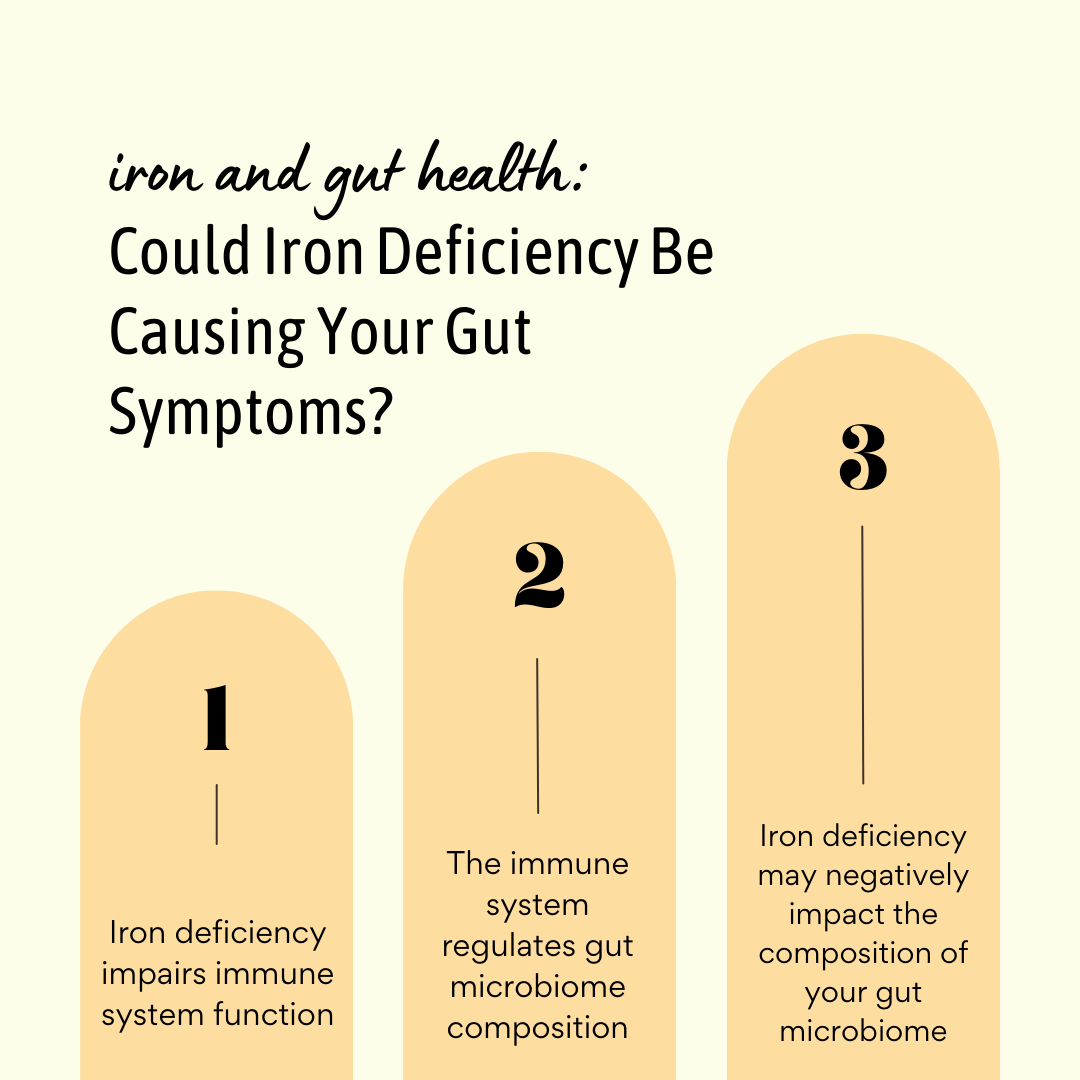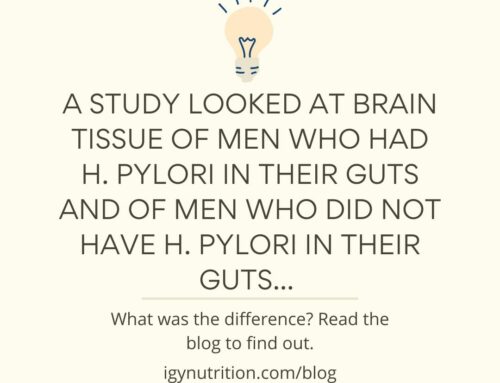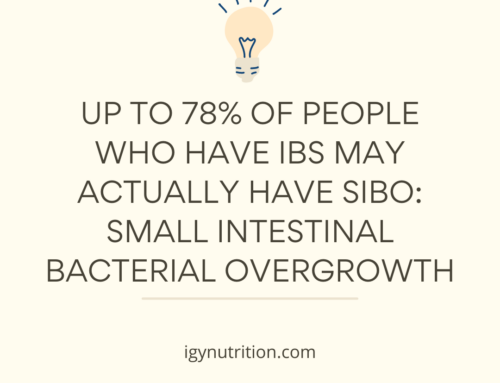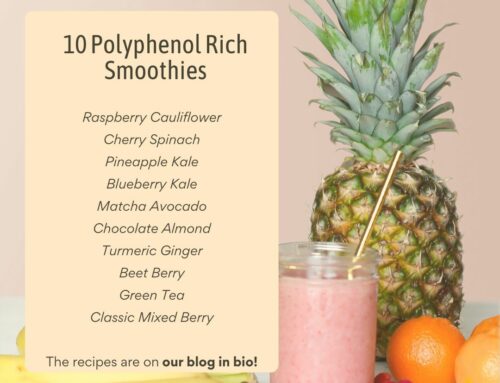Did you know 10 million people in the United States are iron deficient? Iron deficiency is very common – and that’s not a great thing for our guts. If you’re having gut health issues, it’s a great idea to get your iron levels checked.
Today we’ll talk about what iron does for our gut health and our bodies as a whole. Let’s dive in!
What Does Iron Do, Anyway?
Iron is an essential nutrient (1). Its most important role involves oxygen transportation. Yup, you read that right. Oxygen! Pretty critical if you ask us (or scientists).
Iron constitutes hemoglobin, a protein found in red blood cells. Think back to high school Biology – when you breathe in, your red blood cells snatch up the oxygen from your lungs and transport it to all of the cells in your body.
Without enough iron, the body can’t make enough red blood cells – it doesn’t have enough red blood cell building blocks. And without enough red blood cells, the body can’t absorb enough of the oxygen it breathes (1).
In short, the proper transport of oxygen to our cells depends on iron availability. A lack of oxygen can lead to tiredness, lightheadedness, and many other symptoms.
Without enough iron, we become iron deficient anemic (1). Iron deficiency is a prevalent issue in America – over 5 million people deal with it yearly.
Symptoms of iron deficiency include:
- Fatigue (1, 2)
- Lightheadedness (1, 2)
- Impaired thyroid function (3)
- Hair loss (4)
- Body composition changes (5)
- Impaired immune function (6)
- More
Yup, iron deficiency is not fun.
Iron and Gut Health
So what does that have to do with gut health?
Proper immune function is key to a healthy gut. The immune system regulates your gut microbiome composition (7, 8). When bad actors (dysbiotic bacteria) enter your microbiome, who do you think handles removing them? Yep – your immune system.
Though there isn’t much research regarding iron deficiency’s direct effects on gut health, there is ample evidence that iron deficiency impairs immune function (6). And an impaired immune system is shown to detriment gut health by putting one at risk of developing nasty symptoms of dysbiosis, like bloating, gas, and irregular motility (7, 8).
The bright side is that iron deficiency is easily fixed by consuming extra dietary iron, taking supplements, or receiving an iron infusion.
Okay, you get it – iron deficiency is BAD. But how would you know if you have an iron deficiency in the first place? Let’s take a look.
Testing Your Iron Levels
If you suspect iron deficiency, you’ll want to get a ferritin blood test (6). Why ferritin and not iron? Think of ferritin as the storage form of iron. If your body hardly has any stored iron (ferritin), that’s typically a cardinal sign of iron deficiency.
If you have symptoms of iron deficiency but fall on the low end of the healthy ferritin range, say 40 ng/mL and under, safely attempting to increase it may benefit you. Some people feel better with more iron available to their bodies. It may be worth a shot, at least.
How do you go about getting a ferritin blood test? Most healthcare providers, like general physicians, can order a test for you, covered by insurance. Sometimes, however, purchasing one on your own is cheaper and faster.
Consider ordering a blood test from Ulta Labs, where ferritin tests usually run for about $20. If you order a test through Ulta Labs, you can go to a Quest Labs location (in nearly every county in the United States) to get your blood drawn. Ulta Labs will typically notify you of your results within three days.
We always recommend working with a healthcare professional to interpret the results of your blood tests, especially if they’re out of the healthy range. However, we understand that many of us do not have access to one.
Read on to find out how to handle iron deficiency safely!
Iron-Rich Foods
Consuming plenty of iron-rich foods is key to any well-rounded diet, but it’s crucial for those struggling with iron deficiency.
Let’s take a look at some iron-rich staples below (9):
- Red meat
- Spinach
- Tofu
- Iron-enriched breakfast cereals
- Beans
- Pumpkin seeds
- Oysters
- Mussels
- Chicken liver
You might think – I eat many of these foods quite often, but my iron is still low. You may struggle to absorb iron from your food, which is especially common among those with poor gut health (10).
Many doctors and dietitians combat iron deficiency by having their patients eat iron-rich foods and foods high in vitamin C simultaneously.
Pairing iron-rich foods with foods high in vitamin C may help to mitigate poor iron absorption. Vitamin C “facilitates iron absorption by forming a chelate with ferric iron at acid pH that remains soluble at the alkaline pH of the duodenum -” meaning it makes iron much easier for your digestive system to absorb (11).
Let’s take a look at some sample meals that are high in both iron and vitamin C (12):
- Ground beef with sauteed red pepper and rice
- Tofu stir fry including spinach, eggs, and tomatoes
- Iron-enriched breakfast cereal with pumpkin seeds and strawberries on top
- Rice and beans with sauteed red pepper
Is it not sounding too appetizing to you? Supplementation may be the best route for picky eaters and those on the go.
Supplementation
Before you jump into iron supplementation, please read this: consuming too much iron at once can be dangerous (13). It is imperative to follow the serving size directions on the bottle. Downing an entire bottle of iron supplements in a week will not fix your deficiency – instead, it will give you a lot of digestive tract pain.
Okay, with that word of warning out of the way, let’s talk about supplementation. There are several forms of iron on the average drug store shelf., but 65 mg of ferrous sulfate (a form of iron) taken with 500 mg of vitamin C per day seems to be most effectively absorbed (14).
However, watch out – don’t take your iron supplement at the same time you take any calcium-rich supplement. Calcium seems to inhibit iron absorption (15).
If supplementation and a change in diet do not fix your deficiency, you’ll want to speak to a doctor. They may be able to prescribe you an iron infusion, during which your body is provided a form of iron intravenously (into your blood through your veins).
Takeaway: Tackle Iron Deficiency for Optimal Health
Let’s sum it up. Iron is an essential nutrient. We rely on iron for the proper transport of oxygen to our cells. A lack of oxygen can lead to tiredness, lightheadedness, and many other symptoms. Without enough iron, we become iron deficient anemic, which can cause various symptoms, including fatigue, lightheadedness, impaired thyroid function, hair loss, body composition changes, impaired immune function, and more.
Though there isn’t much research regarding iron deficiency’s direct effects on gut health, there is ample evidence that iron deficiency impairs immune function. And an impaired immune system is shown to detriment gut health by putting one at risk of developing nasty symptoms of dysbiosis, like bloating, gas, and irregular motility.
To determine if you’re iron deficient, you’ll want to test your serum ferritin levels (a blood test). We strongly encourage you to work with a healthcare professional to help you manage your iron deficiency (or to find out if you have one in the first place). Safely attempting to increase your ferritin levels may benefit you.
Consuming plenty of iron-rich foods is key to any well-rounded diet, but it’s crucial for those struggling with iron deficiency. Many doctors and dietitians combat iron deficiency by having their patients eat iron-rich foods and foods high in vitamin C simultaneously. That’s because vitamin C makes iron much easier for your digestive system to absorb.
Supplementation may be the best route for picky eaters and those on the go. But before you jump into iron supplementation, please read this: consuming too much iron at once can be dangerous (7). It is imperative to follow the serving size directions on the bottle.
There are several forms of iron on the average drug store shelf, but 65 mg of ferrous sulfate (a form of iron) taken with 500 mg of vitamin C per day seems to be most effectively absorbed. Remember not to take your iron supplement at the same time you take any calcium-rich supplement. Calcium seems to inhibit iron absorption.
Thanks for joining us today! Tag us in photos of your iron-rich meals on Instagram @igynutrition. See you next time!
References
- https://www.hsph.harvard.edu/nutritionsource/iron/#:~:text=Iron%20is%20a%20major%20component,oxygen%2C%20which%20leads%20to%20fatigue.
- https://pubmed.ncbi.nlm.nih.gov/28189173/#:~:text=Iron%20deficiency%20is%20one%20of,hair%20loss%2C%20and%20restless%20legs
- https://link.springer.com/article/10.1007/s12011-017-0954-x
- https://onlinelibrary.wiley.com/doi/abs/10.1046/j.1365-2230.2002.01076.x
- https://pubmed.ncbi.nlm.nih.gov/33716980/
- https://pubmed.ncbi.nlm.nih.gov/20878427/#:~:text=Iron%20and%20immunity%20are%20closely,%2C%20monocytes%2C%20macrophages%2C%20microglia%20and
- https://www.nature.com/articles/s41422-020-0332-7
- https://www.nature.com/articles/nri.2017.7
- https://www.nal.usda.gov/legacy/sites/default/files/iron_0.pdf
- https://www.ncbi.nlm.nih.gov/pmc/articles/PMC7400826/#:~:text=Inflammatory%20bowel%20disease%20leads%20to,commensal%20microbiota%20bacteria%20%5B71%5D.
- https://pubmed.ncbi.nlm.nih.gov/6940487/#:~:text=Ascorbic%20acid%20facilitates%20iron%20absorption,combat%20nutritional%20iron%20deficiency%20anemia.
- https://ods.od.nih.gov/factsheets/VitaminC-HealthProfessional/#h3
- https://www.pharmacytimes.com/view/iron-supplements-treating-iron-deficiency-anemia
- https://pubmed.ncbi.nlm.nih.gov/21462112/#:~:text=Studies%20on%20human%20subjects%20have,at%20risk%20of%20Fe%20deficiency.
- https://ods.od.nih.gov/factsheets/Iron-Consumer/#:~:text=the%20underlying%20disease.-,Can%20iron%20be%20harmful%3F,pain%2C%20vomiting%2C%20and%20diarrhea.




